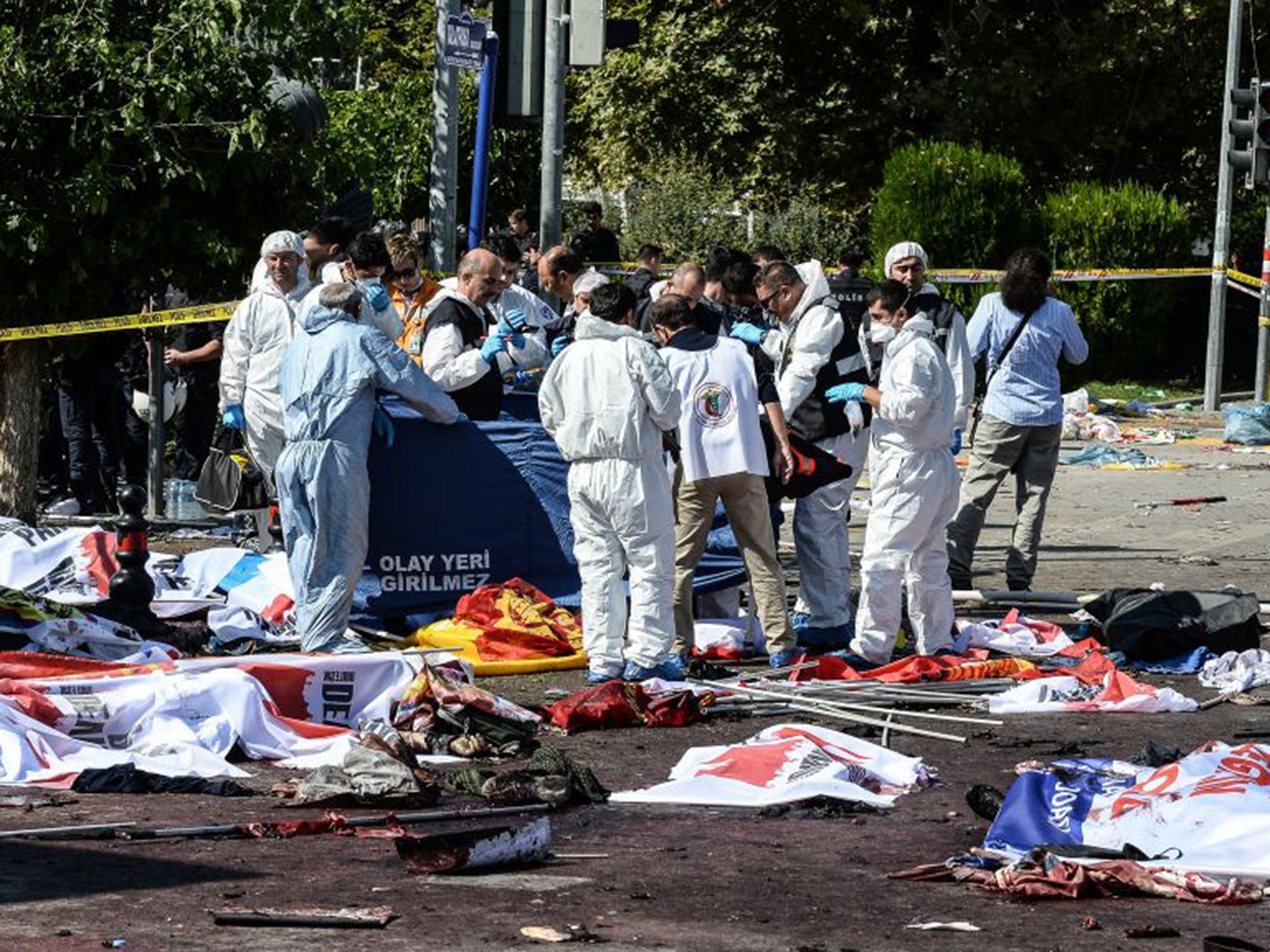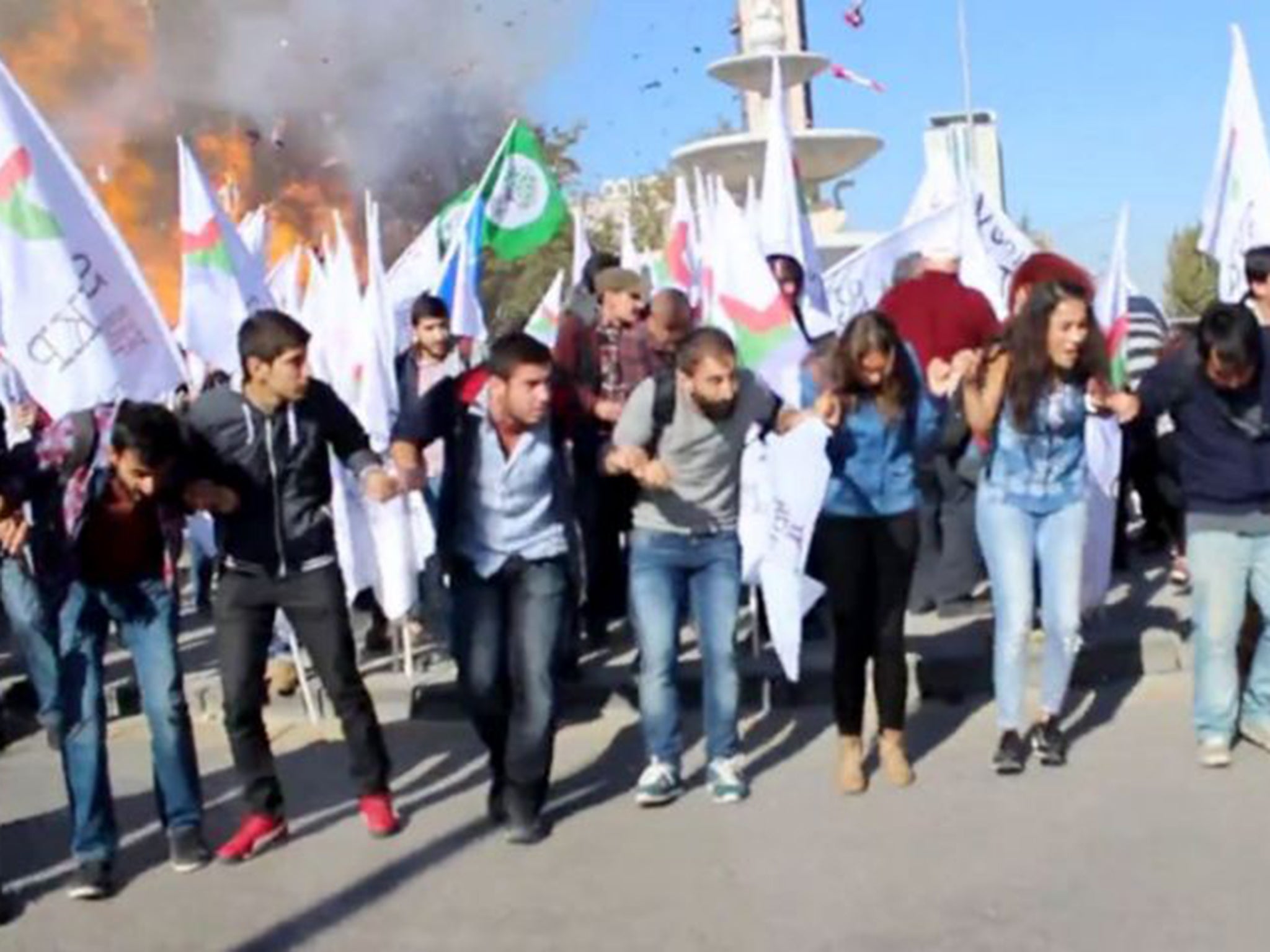Ankara terror attack: President Erdogan calls for unity after explosions kill at least 86 at Kurdish peace rally
The devastation following an attack that also injured 200 people cut through any words the Turkish President could muster

A scene of celebration amid calls for peace turned to carnage as twin explosions in the Turkish capital killed at least 86 pro-Kurdish activists and left-wing marchers at a peace rally in Ankara.
President Recep Tayyip Erdogan called for unity among Turks in the face of the terrorist attack, which injured a further 200 people.
“Like other acts of terror, the attack at the Ankara train station is taking aim at our unity, brotherhood and future,” he said. “The solidarity and determination we are going to display in the face of this attack will be the biggest and the most meaningful response.”
“Like other acts of terror, the attack at the Ankara train station is taking aim at our unity, brotherhood and future
But the devastation cut through any words a politician could muster. Bloodstains, body parts and corpses covered by flags, including those of the pro-Kurdish opposition Peoples’ Democratic Party (HDP), littered the area, as peace marchers tended to the wounded, and hundreds of stunned people wandered around the streets. Bodies lay in two circles, about 20 metres apart, where the explosions had taken place.

Witnesses said the two blasts, seconds apart, happened shortly after 10am, as crowds gathered for the march protesting against the spiralling violence between Turkish forces and Kurdish rebel forces in the country’s south-east.
Video footage showed a line of young men and women holding hands and dancing, and then flinching as a large explosion flashed behind them.
“I heard one big explosion first and tried to cover myself as the windows broke,” said a witness who identified himself as Serdar, 37. “There was shouting and crying ... I could smell burnt flesh.”
More than 60 people were killed at the scene, and nearly two dozen more died in hospital, police said, with the toll expected to rise. Reports stated that the devices were packed with ball bearings.
“There was a massacre in the middle of Ankara,” Lami Ozgen, the head of the Confederation of Public Sector Trade Unions, told the AP news agency.

Selahattin Demirtas, a co-leader of the HDP party, echoed his comments: “We are witnessing a massacre here. A cruel and barbarian attack has been carried out. The death toll is high.” He believed his party’s supporters had been the specific targets.
Mr Demirtas drew a parallel with the bombing of an HDP rally in the south-eastern city of Diyarbakir on the eve of the last election in June, and a suicide bombing blamed on Isis in the town of Suruc near the Syrian border in July, which killed 33 mostly young pro-Kurdish activists.
But those attacks paled beside the carnage in Ankara, the worst bombing in Turkey’s history.
Such was its ferocity that the government banned all photographs and any associated images “that create fear and panic”. Any Turkish media violating the ban would face “permanent blackout”, officials warned.
Many people in Ankara reported being unable to access Twitter and other social media websites after the blasts. It was not clear if the authorities had blocked access to the websites, but Turkey often does impose such blackouts following attacks.
The Prime Minister, Ahmet Davutoglu, said there were “strong signs” that suicide bombers were used and suggested that Kurdish rebels or Isis could be responsible. No group has claimed responsibility for the attack. But Turkey has been on a heightened state of alert since launching a “synchronised war on terror” in July, including air strikes against IS fighters in Syria and bases in northern Iraq belonging to the militant arm of the Kurdish Workers’ Party (PKK). It has also rounded up hundreds of suspected Kurdish and Islamist fighters.
The US State Department, a key Turkish ally, called the bombing a heinous terrorist attack on peaceful demonstrators. “In light of the ongoing violence in Turkey and the region, it is particularly important at this time that all Turkish citizens recommit to peace and stand together against terror,” it said.
Germany’s Chancellor, Angela Merkel, called the massacre “an attempt at intimidation and an attempt to spread fear”.
The attacks come three weeks before an election at which President Erdogan’s AK Party is trying to claw back its power. In the June elections, the party lost the overall majority it had held since 2002, partly because of the electoral success of the HDP. The AK Party claims the HDP is aligned with the rebels of the PKK – a claim it rejects.
Within hours of the blasts, the PKK announced a temporary ceasefire before November’s elections, halting hostilities to allow the election to proceed safely under “equal and fair” conditions.

There were signs on the streets hat Mr Erdogan’s call for unity will go unheeded. In the aftermath of the blasts, angry crowds formed to jeer and throw bottles at a convoy of government ministers as they visited the scene. Lines of riot police were then called to the area where the dead were being counted only hours before.
Some activists have seen the hand of the state in all three of the attacks on Kurdish interests, accusing Mr Erdogan and the AK Party of seeking to stir up nationalist sentiment, a charge vehemently rejected.
“Suruc, Diyarbakir, and now Ankara, all works of murderer Erdogan. We will tear down that palace,” said a 21-year-old student named Tarik, who had been less than 50 metres from one of Saturday’s blasts, while pockets of activists chanted “Murderer Erdogan” and “the murderer AKP will give account”.
On the streets of Ankara, Mr Erdogan was shown the determination, if not the solidarity, he had asked for only hours before.
Join our commenting forum
Join thought-provoking conversations, follow other Independent readers and see their replies
Comments